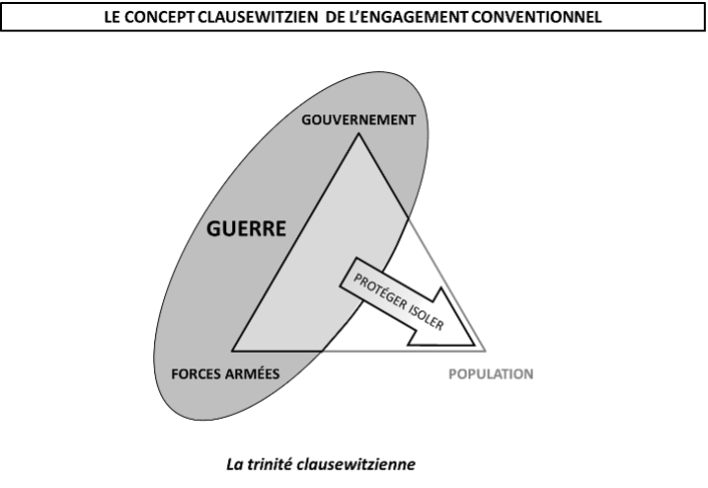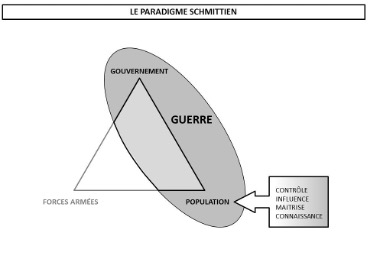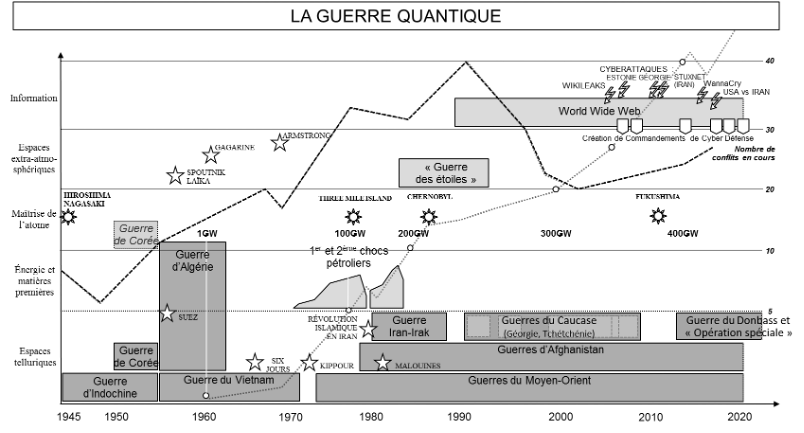Axis 7 - Polemologies and military issues
Lieutenant-Colonel Olivier Entraygues (Dr. HDR)
Associate researchers: Pr. Bernard Wicht (University of Lausanne), Hélène L'Heuillet, Pr. Siniša Malešević
Associate expert: CDT Romain Choron (PhD)
SDRT-I3C PhD students: Col. Benoit Chamberland (PhD student); Ms Fatima Moussaoui (PhD student); Ms Donya Hasnaoui (PhD student); Cdt Jean-François Berthier (PhD student)
In 1945, in France, Gaston Bouthoul created the Institut Français de Polémologies (IFP) and, in 1971, the journal Études polémologiques, which did not survive the death of its founding father. The term polemology was coined to describe the specificity of a scientific approach that considers war as a global social manifestation and not simply as a political expression or singular historical event. Today, the return of war, which is now on Europe's doorstep, is rekindling interest in studies that were for a long time the preserve of a few cenacles and other specialist researchers. In a highly belligerent context, it is interesting to re-appropriate a multi-disciplinary field of study so as to be able to develop its continuity in a renewed form with a view to bringing coherence to fundamental and applied research linked to the term war.
Gaston Bouthoul resolutely believed in the virtues of constant, relentless and scientific examination of war, which he considered to be the main scourge of human societies. Thus, like medicine, war must be studied as a disease of the social body in order to understand it and avoid it. Behind this fundamental aim of polemology, Bouthoul posed an original question: should the problems of peace and war be approached from the point of view of peace, or from the point of view of war? He repeated Vegetius' adage “si vis pacem, para bellum”[1], which is far from being idle or abstruse. This is why, on the one hand, Bouthoul did not create an irenology and, on the other, why he always steered clear of the Peace Research, which was very much in vogue in Anglo-Saxon universities. In defining a ‘polemocentric’ methodological effort, Bouthoul postulated that ‘by starting from war we have a better chance of understanding peace and war, because, by starting from peace, we are likely to end up misunderstanding both’[2]. This axiology could be opposed by Jean-Jacques Rousseau, who wrote in an appendix to the Social Contract that war is born of the social state, or Pierre-Joseph Proudhon, who shows in War and Peace that man's tool in society is usually his weapon of war.
This is why the study of peace is a temporality that should not be dismissed as a field of study in need of renewal: a neo-polemology? Today, however, peacetime is characterized by the principle of uncertainty. It is the notion of relativity applied to the temporality of hostilities that makes it possible to continue to establish the grammar of quantum warfare. In Leviathan, Hobbes writes in chapter XIII that ‘war does not consist merely in battles or in coming to blows, but exists for as long as the will to fight is sufficiently proven’[3. This fundamental aspect- totally absent from Bouthoul's understanding of war- contributes first of all to shattering the legal delimitation which governs international law as expressed in the Westphalian system, i.e. to see a political authority declare war and sign peace. Secondly, the relevance and topicality of Hobbes's writings is that the nature of quantum war lies not exclusively in the fact of fighting (destruction and the physical dimension of the adversary), but ‘in a recognised disposition to fight for as long as there is no assurance to the contrary’.
This observation argues in favour of embedding the field of study in a global temporal continuum. On the strength of these observations, the phenomenon of war becomes a singular temporality that General Thierry Burkhard, Chief of Staff of the French Armed Forces (CEMA), sees as part of three phases that determine the dynamics of relations between States, social groups and individuals: ‘competition, contestation and confrontation’[4]. Secondly, polemological studies fail to incorporate two aspects that are difficult to integrate into planning and/or the military equation: the economic and the psychological. The history of war shows that there are three forms of offensive: physical, economic and psychological. They are expressed in the enlightening analysis of a war borrowed from Greek mythology: the Trojan War described in Homer's Iliad. The Trojan War can be understood through the prism of three strategic options that exist before, during and after the war. The siege led by the Achaeans can be carried out either by encircling the target and taking it by storm (physical dimension); or by means of a blockade cutting off all access to supplies, thus forcing it to surrender (economic dimension); or by corrupting the garrison, encouraging treachery among the people taking shelter behind the fortifications (psychological dimension, i.e. moral and/or spiritual dimension).
Ultimately, the case study of ‘Polemology’ - a French approach and precursor to War Studies in the UK - shows the relevance of reappropriating this intellectual project, which was mainly driven by one man, by giving it a new impetus so that it can be sustained over the long term. When Gaston Bouthoul died, the military had already tried to save him by integrating the IFP into the Fondation pour les Études de la Défense Nationale[5]. Lucien Poirier's initiative modernized IFP's research methods and ambitions, while integrating it more closely with strategic studies[6]. Unfortunately, this initiative came to an end in 1991. So if we say that war still has a bright future, wouldn't it be interesting to revisit polemology in terms of its heuristic, epistemological and methodological aims?
The aim of a neo-polemology is not to present a normative discourse on war. It must place military thought in the academic arena and in intellectual debate, with an eye to the present day. In this sense, it could be understood as an element of coherence with a view to improving dialogue and exchanges between those who practise war, mainly the military, and those who seek to theorise about it - the academic world and think tanks - in order to collectively better understand the learned ignorance of war[7]. Such exchanges born of the confrontation - between the conceptions of some and the perceptions of others - of war- will become the crucible of conflictual fertilization. Thus, neo-polemology should see the emergence of conflicts of method in order to build a methodological hybridity, divergences in the observation of the phenomenon of war in order to present plural interpretations as well as oppositions in the analysis of results.
From an academic and military point of view, the analysis of war is still based on the paradigm carried by the Clausewitzian trinity - government, armed forces, population - of conventional engagement which characterises state warfare. This was the yardstick for analysing war at the time of the Congress of Vienna, when Clausewitz wrote Vom Kriege.
Today, however, the statist nature of this paradigm, with its unambiguous distinctions between the concepts of peace-war, military-civilian, combatant-non-combatant, army-police, friend-enemy, enemy-criminal, inside-outside, before-and-after, ex-ante and ex-post legitimacy, is no longer operative. Faced with an enemy that may be indeterminate because it is non-state, but above all because collective intellectual and moral cowardice prevents it from being defined, war has become momentarily indeterminate. To get out of this confusion, which should help us to better analyse the Russian-Ukrainian war, the student of war proposes first of all to redefine war as a confrontation between two or more human groups who oppose each other on the basis of ideas, values, interests and powers, and in which the final objective is dominance, and whose paroxysm is the expression of armed violence: death, or physical and moral destruction, individual or collective, of man. If, in the past, war could be described by Gaston Bouthoul as deferred infanticide, it must now also be understood as an accumulation of individual or mass homicides committed by one human group with a view to ensuring domination over another. This new definition of war no longer implies the existence of political organizations, whether state, supra-state or ad hoc alliance, headed by a single or multi-headed authority with a defined decision-making cycle and an organized army.
This is why, faced with the phenomenon of the endemic return of war since 9/11 - a quarter of a century of war against Jihadism and Islamism now superimposed on a decade of war in the Donbass and Russian aggression in Ukraine - a new theoretical model of war can be proposed. Hewishes to qualify it with the adjective quantum. It can in no way be described as a hybrid war, since it is in fact the superposition of a civil war and a state war. Quantum war is essentially based on the human and telluric dimensions, i.e. the expression of the link that unites groups of people to territories in a geo-historical flow. Moreover, this war is temporarily calling into question the effectiveness of the use of armed force; it is perhaps arguing for a strengthening of public force through the development of self-defense forces better adapted to this new morphotype of warfare. By analogy with physics applied on a small scale, that of the atom, quantum war pits state-type armies against a handful of combatants that Carl Schmitt calls ‘irregulars’ or ‘partisans’.
The research question is part of the paradigm shift between state warfare and quantum warfare, since the former is now embedded in the latter. For Clausewitz, the objective of abstract warfare, i.e. war that is planned, the war plan, must encompass three elements: military forces, territory and the enemy's will. The conduct of war thus imposes the following overall military objectives: 1. to destroy the enemy's forces, 2. to conquer his territory and 3. to curb his will. In contrast, in quantum warfare: 1- the enemy does not necessarily have any identified armed forces, 2- his territory merges with ours, and 3- he is more resilient than we are! This is why, because Clausewitz's grammar which governs mainly state warfare is no longer operative, it has become necessary to propose a different intellectual posture to the critics in order to make the conflict we are observing intelligible. Thus the characteristic of this observed war is based on the Schmittian paradigm as opposed to the Clausewitzian concept of conventional engagement (see diagram below).
Faced with this new polemological reality, the student of war has to develop new intuitions to try to understand phenomena that he cannot perceive. If the quantum cloud, the uncertainty principle, the phenomenon of entanglement and instantaneous action at a distance become the main properties of Einstein's physics, they could easily be transposed to modern warfare. For physicists and strategists alike, the quantum world is one in which space and time have become absolutely relative. Our difficulty is that we were not brought up in a quantum world.
To understand quantum warfare, we need to live in a different frame of reference, i.e. in a world governed on a very small scale. An indeterministic world in which, for example, small groups are more resilient than large ones and where the uncertainty principle is a determining factor. This war is played out in blurred ensembles where boundaries and fundamental notions are blurred.
In order to develop our central question, we need to define quantum warfare by incorporating two aspects that are often absent from the military equation: the economic and the psychological. The history of warfare shows that there are three forms of offensive: physical, economic and psychological.
They are expressed in the analysis of a war borrowed from Greek mythology: the Trojan War described in Homer's Iliad. The Trojan War can be understood through the prism of three strategic options that exist before, during and after the war. The siege conducted by the Achaeans can be carried out either by encircling the target and taking it by storm (physical dimension); or by means of a blockade cutting off all access to supplies, thus forcing it to surrender (economic dimension); or by corrupting the garrison, encouraging treachery among the people taking shelter behind the fortifications (psychological dimension, i.e. moral and/or spiritual dimension).
This is the conceptual framework for the quantum war that the team wants to refine: a war in which the economic and ideological have taken precedence over the physical and military dimension. The war of the present day becomes the expression of the obsolescence of regular armies, undermined by these small strategic objects. The Clausewitzian paradigm that we have developed over fifty years of nuclearized peace is in the process of eliminating itself, because its use would result in mutual suicide or genocide accepted by public opinion. Can war continue to be the armed arm of a negative political instrument in which megatons respond to megatons by calling themselves ‘deterrent forces’?
[1] VÉGÈCE, Traité de l’art militaire –Epitoma rei militaris, Trad. Victor Develay, 1859, 233 pages.
[2] FREUND Julien, Étude polémologiques, numéro 24, juin 1981, page 40.
[3] Hobbes, Le Léviathan, traduction de François Tricaud, Éditions Sirey, Paris, 1971, 780 pages.
[4] Concept d’Emploi des Forces Terrestres, CDEC, septembre 2021, 62 pages.
[5] Arrêté du 17 juillet 1980, signé par Yvon Bourges, ministre de la défense.
[6] Mathieu CHILLAUD, Les études stratégiques en France sous la Ve République, approche historiographique et analyse prosoprographique, thèse de doctorat soutenue à l’université Montpellier II-Paul Valéry le 17 avril 2018.
[7] Olivier Entraygues, Regards sur la guerre, l’École de la défaite, préface d’Alain Bauer, Éditions Astrée, 2020, page 87.
Related research questions
- To study new forms of warfare based on the interaction of three forms of offensive: physical, economic and psychological.
- Revisit polemology in terms of its heuristic, epistemological and methodological aims.
- To question the professed theories of hybrid warfare or asymmetric warfare in the light of data gathered in current conflict zones, such as the war in Ukraine.
- To contribute to the work of the Centre de doctrine militaire des armées (CEDC), based on the work of the team and its doctoral students.



